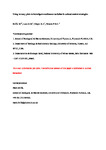Using ternary plots to investigate continuous variation in animal contest strategies.
| dc.contributor.author | Briffa, Mark | |
| dc.contributor.author | Lane, Sarah | |
| dc.contributor.author | Chappin, K | |
| dc.contributor.author | Peixoto, PEC | |
| dc.date.accessioned | 2020-07-17T09:06:09Z | |
| dc.date.issued | 2020-09 | |
| dc.identifier.issn | 0003-3472 | |
| dc.identifier.issn | 1095-8282 | |
| dc.identifier.uri | http://hdl.handle.net/10026.1/16069 | |
| dc.description.abstract |
Studies on the strategic rules used by fighting animals usually attempt to categorize fights as falling into one of two discrete types: self-assessment and mutual assessment. With self-assessment, losers give up when they cross an individual costs threshold, without reference to the fighting ability (resource-holding potential, RHP) of their opponent, while in mutual assessment, losers compare their own RHP to that of their opponent and give up if and when they determine themselves to be the weaker rival. However, it has recently been suggested that this discontinuous view of variation in assessment strategy might be an oversimplification. This is because use of information on self-RHP, opponent RHP and resource value is likely to show continuous variation across individuals, populations and species. While the possibility of this continuous variation is often ignored, we suggest that we can gain a better understanding of decision making during fights by considering the relative contributions of these three information sources to the giving-up decisions of losers. Here, we use ternary plots to demonstrate how the relative contribution of self-RHP, opponent RHP and resource value to decision rules can be illustrated using simulated and real contest data, as an aid to achieving greater depth in discussions of variation in assessment rules. | |
| dc.format.extent | 85-99 | |
| dc.language | en | |
| dc.language.iso | en | |
| dc.publisher | Elsevier Masson | |
| dc.subject | assessment | |
| dc.subject | contest | |
| dc.subject | decision | |
| dc.subject | fighting | |
| dc.subject | loser | |
| dc.subject | resource | |
| dc.subject | RHP | |
| dc.subject | RV | |
| dc.subject | winner | |
| dc.title | Using ternary plots to investigate continuous variation in animal contest strategies. | |
| dc.type | journal-article | |
| dc.type | Note | |
| dc.type | Journal | |
| plymouth.author-url | https://www.webofscience.com/api/gateway?GWVersion=2&SrcApp=PARTNER_APP&SrcAuth=LinksAMR&KeyUT=WOS:000566536800009&DestLinkType=FullRecord&DestApp=ALL_WOS&UsrCustomerID=11bb513d99f797142bcfeffcc58ea008 | |
| plymouth.volume | 167 | |
| plymouth.publication-status | Published | |
| plymouth.journal | Animal Behaviour | |
| dc.identifier.doi | 10.1016/j.anbehav.2020.06.006 | |
| plymouth.organisational-group | /Plymouth | |
| plymouth.organisational-group | /Plymouth/Faculty of Science and Engineering | |
| plymouth.organisational-group | /Plymouth/Faculty of Science and Engineering/School of Biological and Marine Sciences | |
| plymouth.organisational-group | /Plymouth/REF 2021 Researchers by UoA | |
| plymouth.organisational-group | /Plymouth/REF 2021 Researchers by UoA/UoA04 Psychology, Psychiatry and Neuroscience | |
| plymouth.organisational-group | /Plymouth/Research Groups | |
| plymouth.organisational-group | /Plymouth/Research Groups/Marine Institute | |
| plymouth.organisational-group | /Plymouth/Users by role | |
| plymouth.organisational-group | /Plymouth/Users by role/Academics | |
| plymouth.organisational-group | /Plymouth/Users by role/Researchers in ResearchFish submission | |
| dcterms.dateAccepted | 2020-05-04 | |
| dc.rights.embargodate | 2021-7-29 | |
| dc.identifier.eissn | 1095-8282 | |
| dc.rights.embargoperiod | Not known | |
| rioxxterms.funder | Biotechnology and Biological Sciences Research Council | |
| rioxxterms.identifier.project | The role of skill in animal contests: Analysis of a neglected RHP trait in fighting hermit crabs | |
| rioxxterms.versionofrecord | 10.1016/j.anbehav.2020.06.006 | |
| rioxxterms.licenseref.uri | http://www.rioxx.net/licenses/all-rights-reserved | |
| rioxxterms.licenseref.startdate | 2020-09 | |
| rioxxterms.type | Journal Article/Review | |
| plymouth.funder | The role of skill in animal contests: Analysis of a neglected RHP trait in fighting hermit crabs::Biotechnology and Biological Sciences Research Council |


